| story by | |
| photos by | Thad Powell and Steven Hertzog |
| OPEN A PDF OF THE ARTICLE |
Though many skilled trades such as plumbing are taken for granted in our daily lives, when something goes wrong, you bet you’re going to be begging for a plumber’s help.
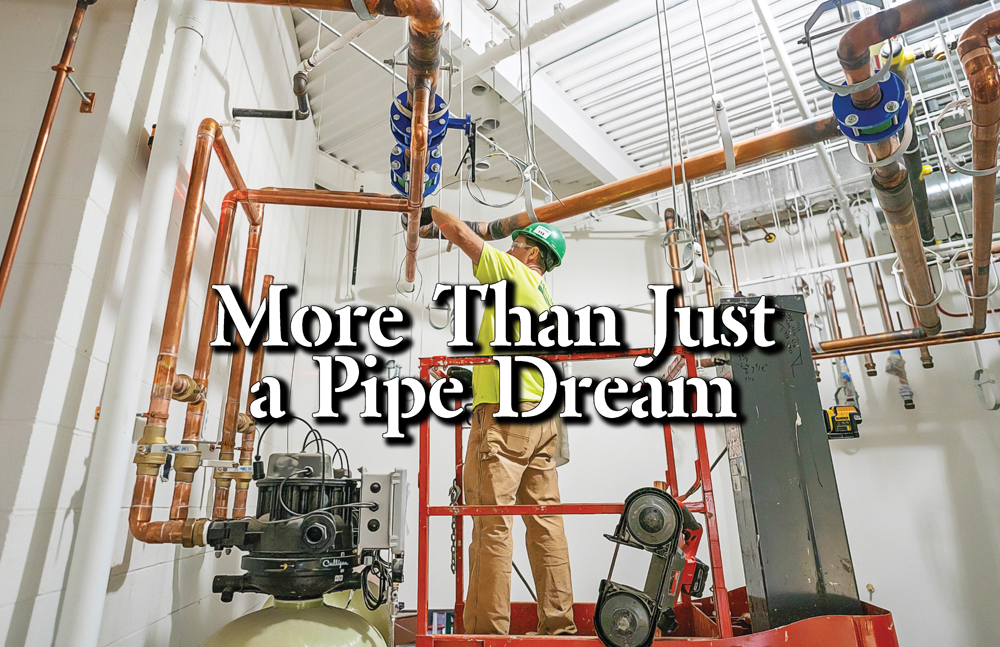
McElroy ‘s constructing domestic water piping systems in a new university building’s mechanical room.
Picture this: The time is 11:43 p.m. on a Sunday evening. The family has been in bed for an hour and a half. Suddenly, everyone is woken by a scream. After discovering the human alarm was triggered by the pipes backing up, you realize there is nothing you can do. Who do you call? If you answered the plumber, you answered correctly. What would we do if we lived in a world without plumbing and plumbers? It would certainly be a different landscape. These hidden internal systems most of us take for granted in our daily lives are convenient and keep us comfortable while bringing one of the most important resources straight into our homes and businesses.
Skilled trades such as plumbing, while seemingly simplistic and many times overlooked, can be a serious challenge. As long as plumbing and pipe systems exist, we will need skilled tradespeople in plumbing and pipe fitting. Plumbing is the network of pipes and other elements like tanks for holding and connections that bring our water supply into our homes, schools and businesses for heating, sanitation and drinking. Paul Bost, owner of Jim Bost Plumbing, explains: “Pipe fitting are things that are threaded together, like gas lines, boiler systems, high-pressure systems and industrial/commercial.”
While many of today’s careers may vanish in the years or decades ahead, talented tradespeople will always be in demand wherever you go, explains Dan Beal, president of McElroy’s Inc. For many years, there has been a decline in skilled labor for occupations such as plumbing and pipe fitting. One reason for this is the focus placed on going to college instead.
Recently, there has been a push to encourage people to reconsider applied technologies and skilled-trade positions. From a purely practical standpoint, communities need skilled labor. This, of course, does not diminish the need for higher education through colleges. Beal, who has a master’s degree in mechanical engineering from The University of Kansas, states, “I understand there will always be careers that require a college degree. Even so, more and more educators are realizing the trades offer outstanding careers for young people who like working with their hands and who enjoy making things people need and depend upon.”
McElroy’s is developing strong ties with area high schools to help students discover the valuable opportunities that best suit their desires, he adds. “Considering that tradespeople get paid to learn on the job from skilled mentors, careers in the trades make a lot of financial sense, too.”
There are many reasons for individuals to get involved in the trades. Joe Bradshaw, owner of Blue Duck Plumbing, says one way to get involved as a plumber is to create a résumé and apply to a plumbing company directly. “Another way to better your chances of being sought by a plumbing company,” he says, “is to go to a technical school, and while you are going to school, start applying.”
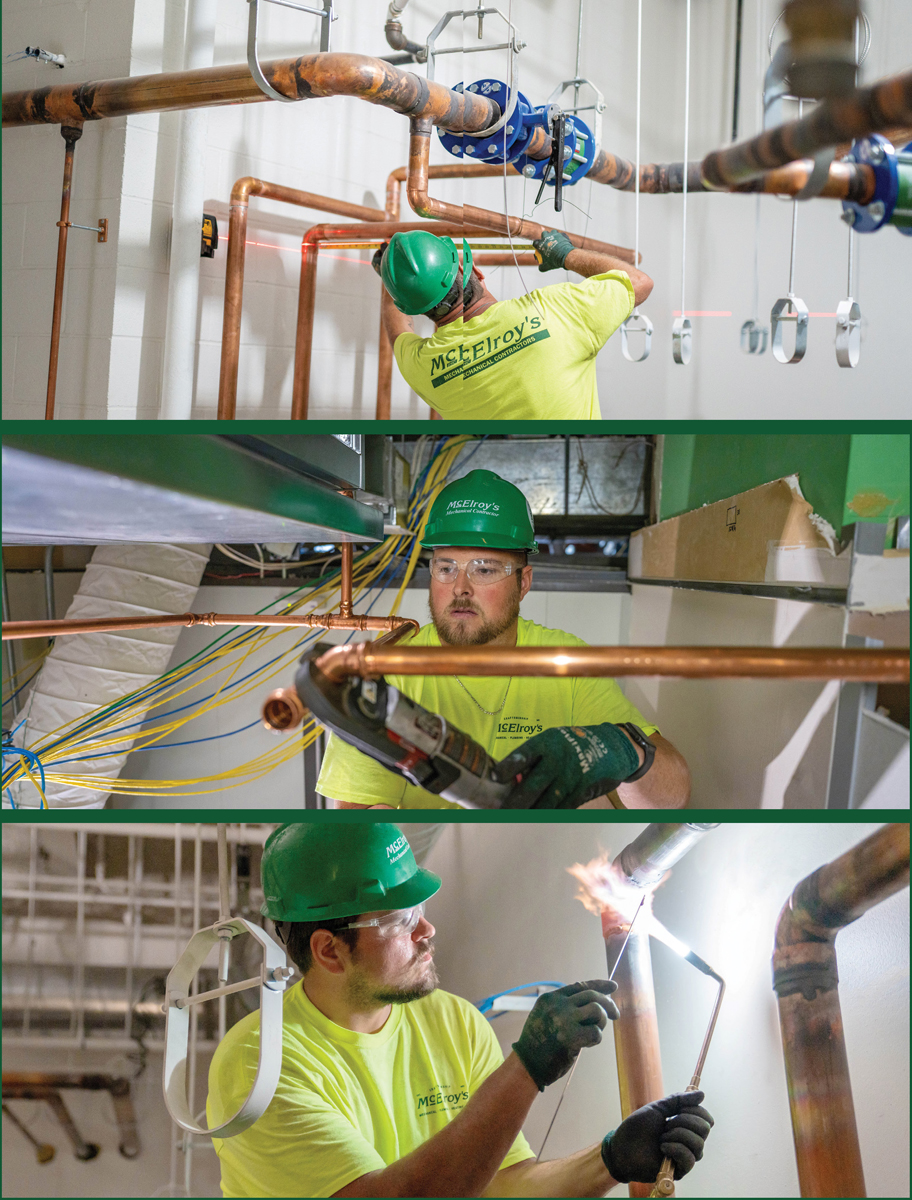
Top to bottom: A McElroy’s journeyman plumber carefully measures and laser-aligns piping systems for precise craftsmanship precise craftsmanship;
Plumbing technician uses a ProPress crimping tool to join copper pipe securely, without heat join heat; Brazing copper pipe in the domestic water supply lines of the new Washburn University Law building the building.
When he was starting out, Bradshaw worked in a variety of trades, including as a maintenance man, engineer and teacher, before settling on plumbing. “Several things attracted me to plumbing: the challenge and adventure of the work, the stability of the field, and the pay is good,” he says. He also acknowledges that, “College costs in time and money, whereas in plumbing, you are paid while you learn. In Kansas, it takes about two years to go from an apprentice to qualify to test for journeyman status.”
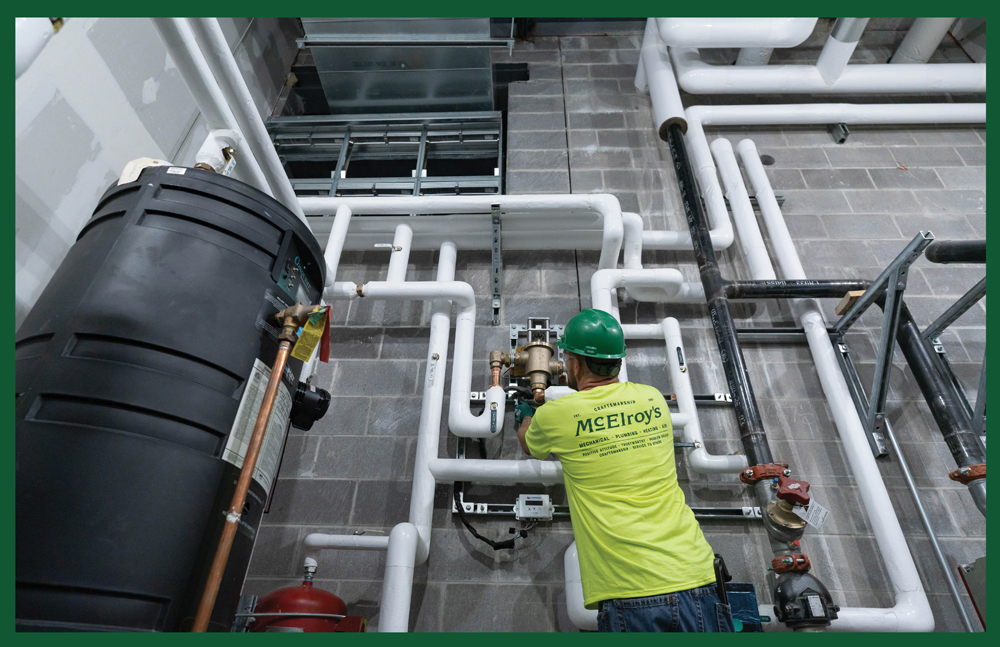
Adjusting the hot water mixing valve in the mechanical room of the TRC of Douglas County.
He says in recent years, he has seen the quality of candidates for plumbing improve significantly. And Bradshaw believes in vocational training in education. “This is a great opportunity for the community to prepare many of its younger citizens for successful careers. I am pleased with Peaslee Tech and have hired several people from their classes. We need more such help in the area of vocational training.”
LOCAL MATTERS
Our Local Advertisers – Making a Positive Impact
Bost agrees that Peaslee Tech is a good local school. The focus of high schools to send kids to college has caused the trades to be “grossly understaffed.” He says he believes the easiest way to get into the plumbing business is to call plumbing contractors and see if they’re hiring. “A lot of business owners would rather hire a person that has no experience so they can be trained how that particular contractor likes to plumb.”
Bost’s path to plumbing was generational. His father started Jim Bost Plumbing in 1983, and he grew up with a tool belt and “spent summers on job sites.” When asked about changes in plumbing, he explains, “The plumbing industry has changed a lot in the last 50 years. Safer practices, better materials and technology always help advance the trades. Technology is really the leading factor in making plumbing systems more energy efficient, better for the environment and easier to install; but sometimes, technology gets in the way and makes some things more difficult to repair.”
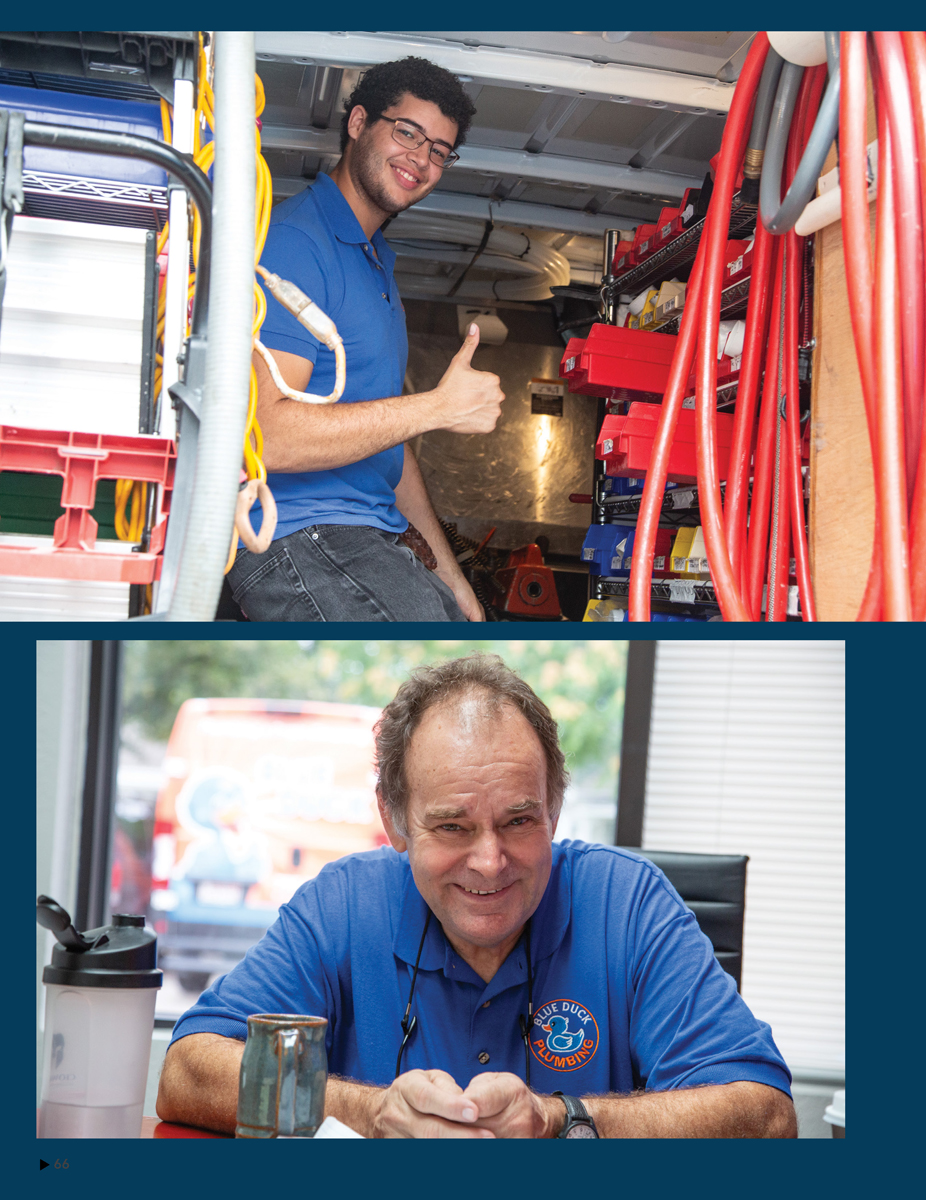
Caleb Harris, a Peaslee Tech student and a Blue Duck employee; below: Joe Bradshaw, owner of Blue Duck.
Blue Duck’s Bradshaw agrees that technology has drastically changed the plumbing profession. He points to how different pipe materials have come along and replaced old materials. “Cast iron was replaced with PVC; Copper with PEX (cross-linked polyethylene); PEX with Type A expansion PEX; pipe-bursting sewer line replacement to replace sewers with just two pits using butt welded HDPE; CIPP (cured-in-place pipe) lining of sewer lines.” He says about new tools and their uses, “Sewer cameras, location tools that allow one to tell on top of the ground where the camera is in the sewer pipe and how deep it is; thermal-imaging equipment to find leaks under slaps; compression tools that replace soldering; flex shafts and jetting machines to clear sewer lines—the list goes on. It is amazing how many new plumbing inventions have been developed in the last couple of decades. It is exciting to see what will be invented next.”
Matthew Wingert, who represents the Plumbers and Pipefitters Union Local 441, also had a family connection for a career in plumbing. He says, “I am a fourth-generation union pipefitter. So going into apprenticeship straight out of high school is what I considered normal. But speaking generally, I don’t know that there is a specific path for anybody interested in the pipe trades.” He says all are welcome to apply to the apprenticeship program then move forward to the math testing and interview process. The “barrier,” in his opinion, would be potential apprentices and members not being aware of the option of being a union tradesperson and the benefits that come along with it.
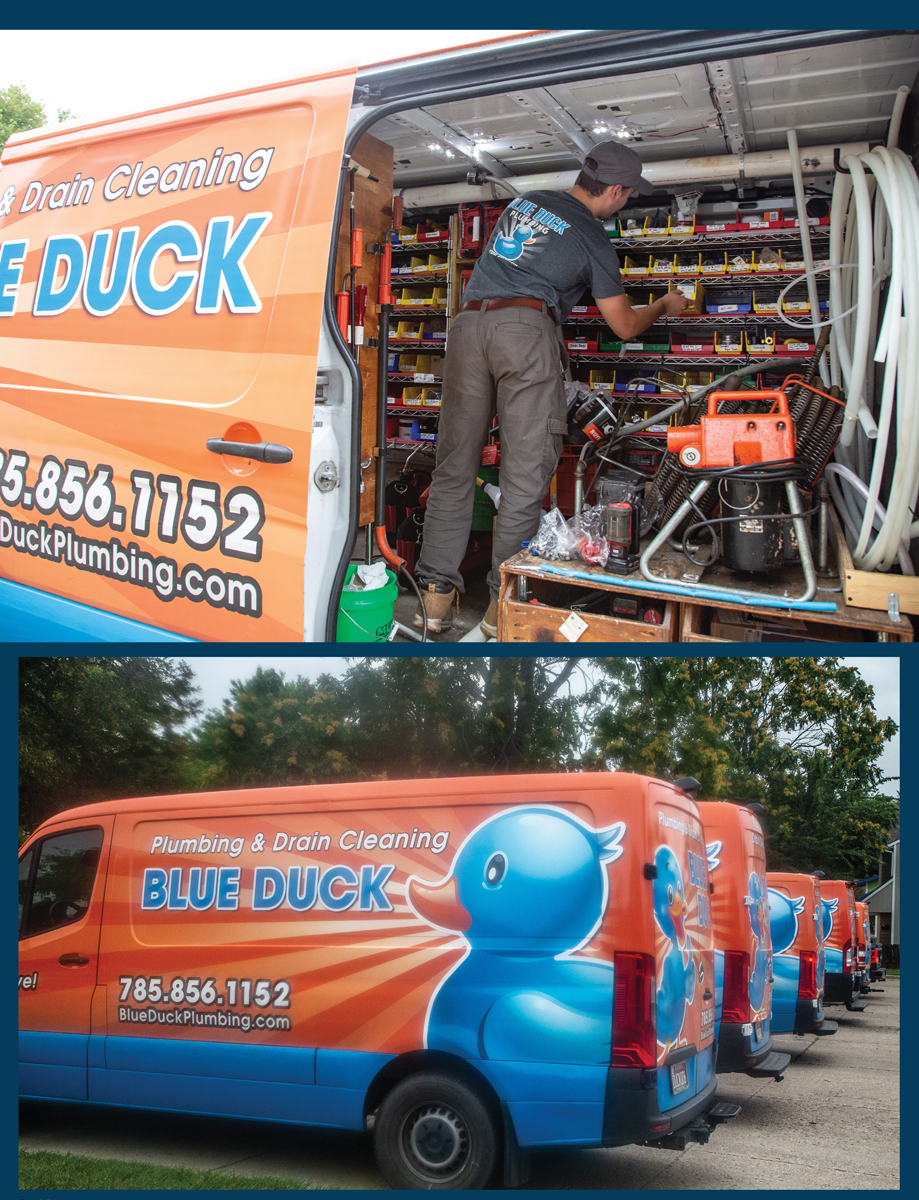
Blue Duck employee organizing supplies in his truck.
Wingert explains the benefits of being involved in skilled trades through the union are substantial. “Many adults are carrying some form of student loan debt. Whereas a person out of high school becomes a union apprentice and graduates five years later with no student debt and making around $85,000 annually at today’s wage rate. A message I always try to convey to young and/or new apprentices and potential future members is: Work hard, and you are guaranteed to go far. It is very simple. You get out what you put in.” And if you can manage that, you will be assured of three things: an excellent hourly wage, provided health coverage and the ability to retire with dignity, he adds. “A common theme amongst all unions regardless of trade.”
Wingert also points to the union as leading the way for fair wages. “[Unions] typically set the prevailing wage/Davis-Bacon wage rates for the state, which means unions set the bar for wages in their respective markets.” Another benefit through the apprenticeship programs is called “transferring,” which allows a journeyman to travel for work or transfer to another local if he or she were to move to another state. Not only can they pick up where they left off in another state, but “the benefit package would kick in upon the transfer and starting work in the members new local, all the while still contributing to the same national pension plan,” he says.
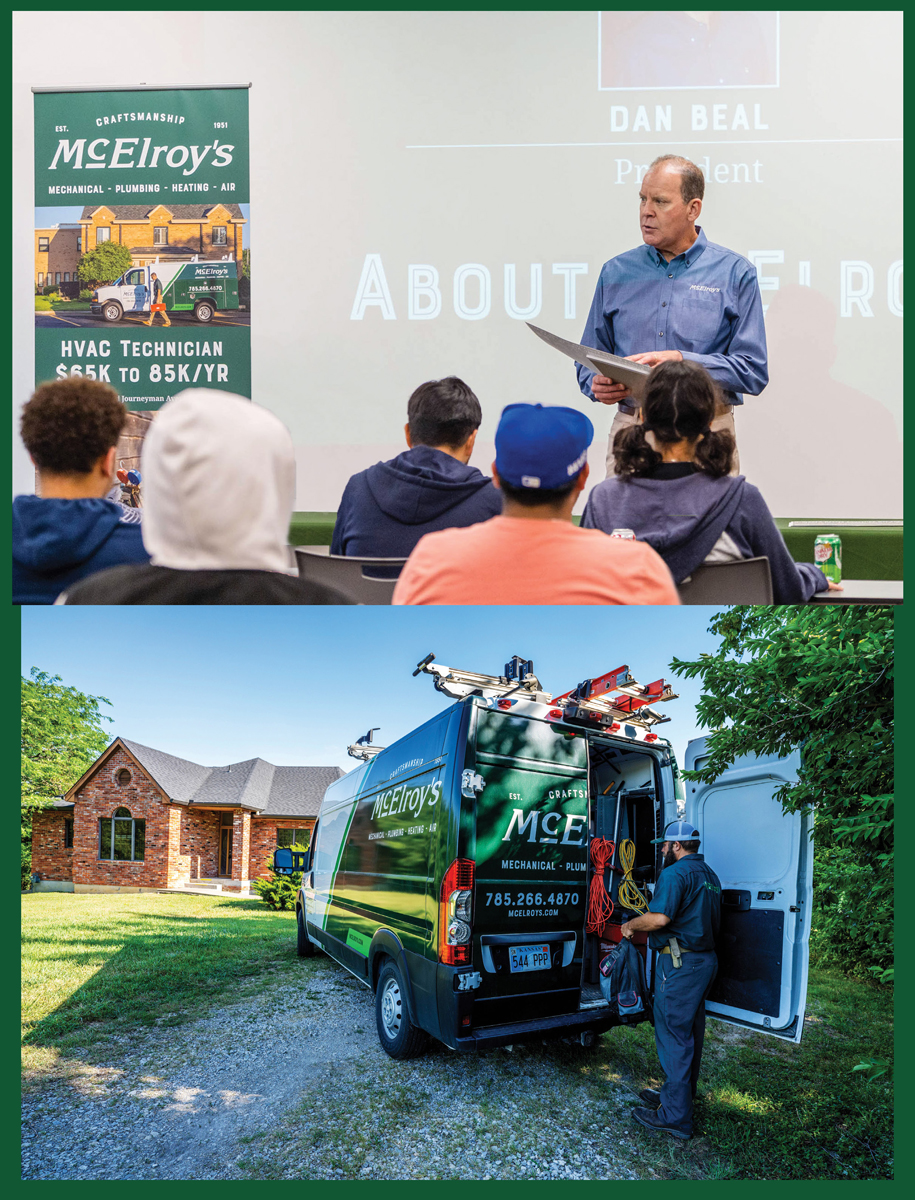
Top to bottom: Dan Beal, President of McElroy’s Inc, discusses careers in the trades with area high school students. Arriving to provide residential plumbing services: remodeling, repairs or emergencies.
McElroy’s has been in business for more than 70 years and is a union contractor. President Beal says, “We hire union technicians who take great pride in the quality of their craftsmanship and their dedication to serving the customer. We do our best to treat all of our team members like family, making them feel seen, appreciated and valued. As a result, we have employees who have stayed with us for 10, 20, 40 years and more.” He says McElroy’s has hired many technicians who have developed skills at area trade schools like Peaslee Tech in Lawrence and Washburn Tech in Topeka. Area high schools often help students connect with technical college classes as juniors and seniors, which is a great time to learn whether a trade career is right for you. Tech school skills increase a person’s odds of getting hired and can make their path through union apprenticeship easier.
Whether a plumber is a part of the union or are independent, it seems there are many overlapping reasons a person would choose the path of applied technologies or skilled trades. Jim Bost Plumbing owner Bost says, “… college is not for everybody. You can make a very good living and provide a very good life if you enjoy working with your hands and fixing things. And that doesn’t have to be plumbing.” He explains that it could be HVAC, a mechanic, an electrician, anything that takes a skill set. “But you have to be willing to work for it and take pride in what you do.”
There’s going to be a point in the very near future, he continues, when tradesmen who are skilled and do high-quality work will be able to “write their own check,” meaning the workforce will not be there. “They will be able to pick and choose what they want to do, and be able to charge whatever amount they want, because there won’t be the workforce to support competition, and that’s kind of scary.”
If you are hard-working, enjoy working with your hands and have the willingness to learn, applied technologies or skilled trades may well be a career path for you to consider. Beal says, “… plumbing and pipe fitting is a very satisfying career. When a homeowner or business owner has a plumbing crisis, a service plumber can save their day.” Plumbers and pipe fitters working in new construction have the satisfaction of helping build the plumbing and piping systems that homes and businesses rely upon, he continues. McElroy’s does a lot of work in the medical and science fields, and in those environments, the complicated piping systems skilled craftspeople create can actually save lives. However, if plumbing and pipefitting don’t describe your interests or skills, we can be thankful that many others are making this choice. “When the pipes are backed up, the sink is dripping or another plumbing issue unfolds, we have the ability to make a call to our local plumber and get the situation corrected quickly.”




